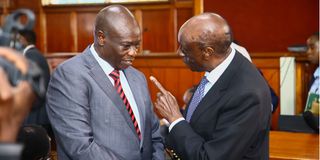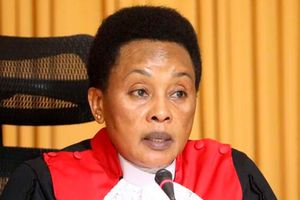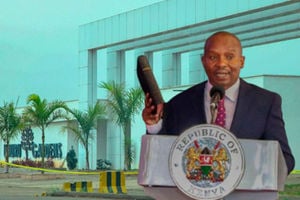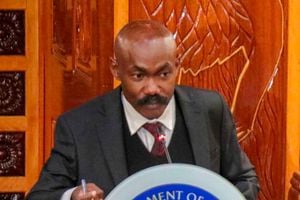
Impeached Deputy President Rigathi Gachagua with Senior Counsel Paul Muite at the Milimani High Court on October 22, 2024, for the hearing of two cases linked to his removal from office.
Does the Deputy Chief Justice have the power to appoint a bench of judges of the High Court to determine a matter that has been certified as raising substantial questions of law?
And if so, did the DCJ Philomena Mwilu authorise the three judges she appointed to determine applications filed by Attorney General and Parliament, to sit on Saturday?
These and many other questions came into sharp focus on Tuesday as lawyers for impeached Deputy President Rigathi Gachagua and other parties appeared before Justices Eric Ogola, Anthony Mrima and Dr Freda Mugambi for the hearing of an application seeking to lift an order blocking Interior Cabinet Secretary Kithure Kindiki from assuming the position of the Deputy President.
Whereas Mr Gachagua’s lawyers submitted that the DCJ does not have the powers to appoint a bench as per article 165(4) of the constitution, the opposing side maintained that the appointment of a bench is administrative work and Chief Justice Martha Koome can delegate the job to her.
Lawyer Kibe Mungai said it was not clear the circumstances that led to the placement of the file before the bench without the express directions of the CJ Koome on its composition.
“It was unconstitutional for the Deputy Chief justice to sit at night to appoint a bench given the fact that even in the numerous cases of abduction, the Chief justice herself has not sat at night to appoint benches authorising them to conduct judicial proceedings on Saturdays and Sundays,” Mr Mungai submitted.
The lawyer further submitted that there was no urgency or special circumstances regarding the National Assembly’s application that would have warranted the DCJ to direct or authorise the bench to sit on Saturday.
He said the three judges failed to observe the proper procedure in handling the file as it appears that there is usurpation of the powers and jurisdiction of the Chief Justice, who is mandated to constitute benches.
Mr Mungai further said there was a conspiracy to commit an injustice from the word go.
“It is our submissions is that the function has been arrogated, exclusively to the Chief Justice and that the deputy chief justice has no powers to authorise of order you,” Mr Ndegwa Njiru said.
The sentiments were echoed by senior counsel Paul Muite, who argued that the speed at which the bench was appointed and the application placed before the three judges was because the government intended to swear-in Prof Kindiki without hearing the petitions challenging Mr Gachagua’s removal.
Mr Muite added that the matter before court was not just about the removal of Mr Gachagua but the precedent that will be set for the removal of deputy president and the removal of presidents in future.
“These are very weighty matters. The orders of Justice Richard Mwongo were given on October 18 at around 4pm. At what time was the file transmitted to the Deputy Chief Justice and when did she sit? We have to articulate on these issues,” he said.
“Forget about the concept of time. What are we hurrying for? This is a matter that has paralysed the nation; it is a serious matter,” veteran lawyer Dr John Khaminwa submitted.
Prof Githu Muigai, for the Attorney General, submitted that the AG’s office must promote and protect and uphold the rule of law and defend the public interest at all times as required by Article 156(6) of the constitution.
The former Attorney General added that the constitution must not be construed to create an absurdity or confuse itself.
Prof Muigai added that the functions of the Chief Justice and her deputy are well defined and in the absence of the CJ, the Deputy Chief Justice can discharge the functions of the Chief Justice.
He said in the present case, Justice Koome was away in Geneva and her deputy gave directions in the matter owing to its urgency.
“The Deputy Chief can appoint a tribunal to remove the president. If she appoints a tribunal to remove the president she can also assign judges to determine matters of great public interest. What can’t she deputise?” he asked.
Prof Muigai said the file was transmitted by the deputy registrar of the High Court in Kerugoya at 3.45pm, according the Judiciary case tracking system, to the DCJ and it wasn’t true that Justice Mwilu went for the file or sat at night to appoint the bench.
Mr Paul Nyamodi, for the National Assembly, submitted that the Chief Justice occupies three separate and distinct offices, among them the head of the Judiciary, the President of the Supreme Court and the chairperson of the Judicial Service Commission (JSC).
The lawyer submitted that the DCJ deputises the Chief Justice as the head of the Judiciary and as the deputy president of the Supreme Court and that the Justice Mwilu cannot be blamed for giving directions because she acted within powers bestowed on her.
Tharaka MP George Murugara, for the National Assembly, said the proceedings were important to all parties and millions of Kenyans have an interest in the cases, hence the reason for urgency.
The court will rule on the application on Wednesday at 3pm.












